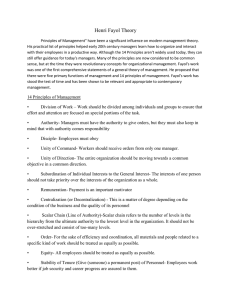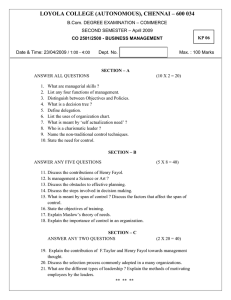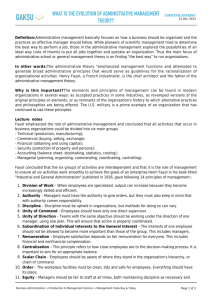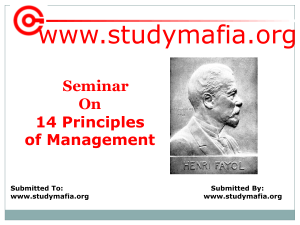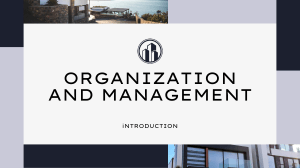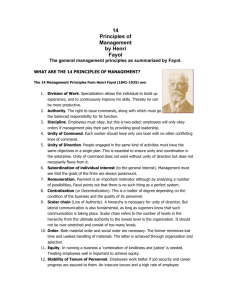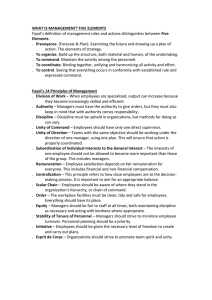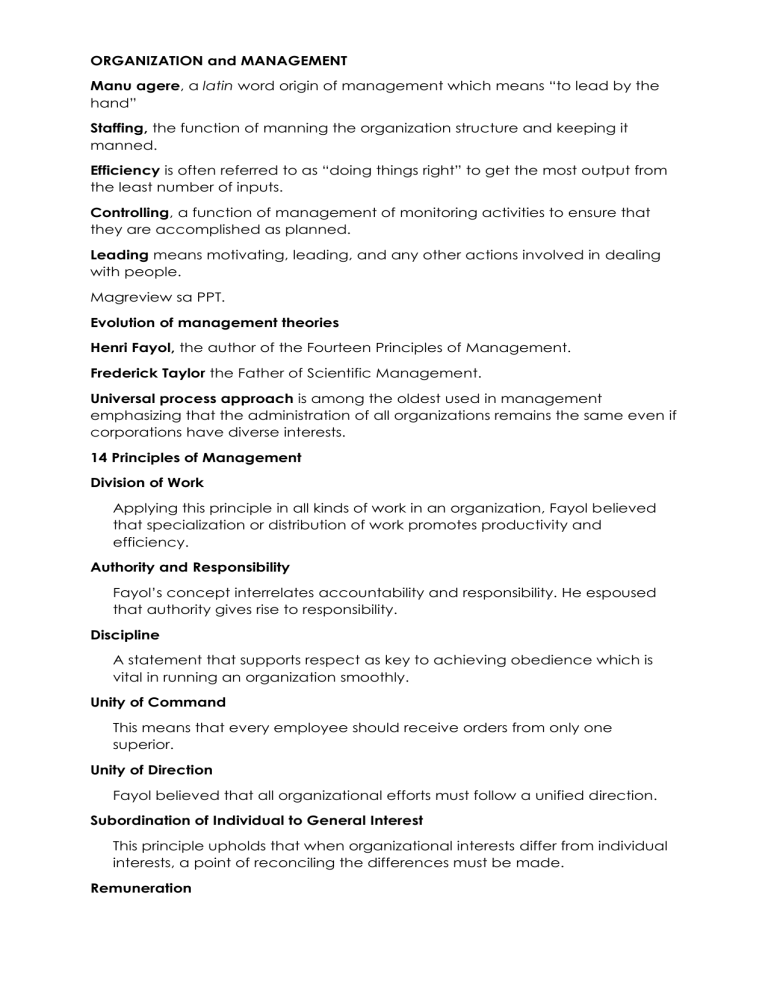
ORGANIZATION and MANAGEMENT Manu agere, a latin word origin of management which means “to lead by the hand” Staffing, the function of manning the organization structure and keeping it manned. Efficiency is often referred to as “doing things right” to get the most output from the least number of inputs. Controlling, a function of management of monitoring activities to ensure that they are accomplished as planned. Leading means motivating, leading, and any other actions involved in dealing with people. Magreview sa PPT. Evolution of management theories Henri Fayol, the author of the Fourteen Principles of Management. Frederick Taylor the Father of Scientific Management. Universal process approach is among the oldest used in management emphasizing that the administration of all organizations remains the same even if corporations have diverse interests. 14 Principles of Management Division of Work Applying this principle in all kinds of work in an organization, Fayol believed that specialization or distribution of work promotes productivity and efficiency. Authority and Responsibility Fayol’s concept interrelates accountability and responsibility. He espoused that authority gives rise to responsibility. Discipline A statement that supports respect as key to achieving obedience which is vital in running an organization smoothly. Unity of Command This means that every employee should receive orders from only one superior. Unity of Direction Fayol believed that all organizational efforts must follow a unified direction. Subordination of Individual to General Interest This principle upholds that when organizational interests differ from individual interests, a point of reconciling the differences must be made. Remuneration Methods of compensating the employees must be based on fairness and equity. Both employer and employee must be mutually satisfied by the manner by which pay and wages are administered. Centralization Fayol’s concept stresses the importance of striking a balance between centralization and decentralization. Both must be in exact proportion to obtain the best productivity result. Scalar Chain Fayol’s tenet is for subordinates to follow the “chain of command” from highest to lowest rank. Order Fayol believed that both material things and people in an organization must appropriately be arranged in an orderly fashion. Equity Fayol believed that principles of justice and fairness generate loyalty and commitment of employees. Stability and Tenure of Personnel This states that employees need a sense of job stability. Unnecessary turnover is dangeros to productivity and insinuates poor management skills. Initiative This principle builds on Fayol’s thoughts that initiative is the ability to map out plans which could promote job satisfaction. Hence, managers should allow employees to exercise initiative. Esprit de Corps This stresses the importance of teamwork and unity on the job. Fayol believed that harmony and collaborative effort promote organizational success. Operational Approach (Scientific Management) refers to the productionoriented facet of management. It focuses on improving efficiency, avoiding waste, and fostering quality. Behavioral Approach is people-centered. This is continually evolving, pointing out that human resources/people deserve to be the heart and core of management activities. It stresses the view that people have wants and needs, perceptions and dreams. The Quantitative or Mathematical Approach (Management Science Approach) A scientific method that features the use of statistical models and systematic mathematical techniques designed at rational and logical decision making. Contingency approach aimed at unifying prior schools of management thoughts, emerged in the 1960s and considered the latest among existing management approaches. Scientific Management Theory - is defined as the use of the scientific method to determine the “one best way” for a job to be done. "To manage is to forecast and to plan, to organize, to command, to coordinate and to control." - Henri Fayol “A manager must have the necessary skills to train and develop his/her employees.” – Susan M. Heathfield Peter Drucker defines management as "the transformation of resources into utility." Fredmund Malik saw the basic task of a management as twofold: marketing and innovation. Management is “the art of knowing what you want to do and then seeing that it is done in the best and cheapest way.” - F.W. Taylor Functions, roles, and skills of a manager. Functions Planning, Organizing, Leading, Controlling. Roles Henry Mintzberg, management scholar who is credited for categorizing and explaining managerial activities as roles. Interpersonal Role Managers perform this type of role by virtue of the authority vested in their position. As a manager, a person is expected to build harmonious relationships with people he or she acts as a figurehead leader and liaison officer. Informational Role this managerial role is based on the concept of effective communication managers are responsible for receiving and transmitting communication cascading information from the management down to the employees and or receiving and transmitting information from the employees up to the management. Decisional Role managers have a major role in effective decision-making they can act as intrapreneurs negotiators or arbitrators in a workplace conflict. Interpersonal Role Figurehead performs and assumes responsibility and axle teas that are social and legal in nature as a symbolic leader. Leader takes charge of motivating employees and directing selection and training activities. Liaison establishes a network of contacts and maintains relationships with people within and outside the organization. Monitor gathers and acquires both internal and external information related to work as well as other issues that may affect organization. Disseminator takes charge of communicating and disseminating information gathered to others within the organization. Spokesperson takes responsibility to communicate and share information to outsiders. Entrepreneur insurance creation of innovative ideas and techniques identifies and initiates fresh improvement concepts and projects. Disturbance handler handles unforeseen difficulties disputes or concerns initiates and implements appropriate corrective action. Resource allocator decides and properly distributes companies’ resources that include time talent and money or funds. Negotiator takes responsibility for safeguarding business interest by defending the organization and representing it in major negotiating concerns affecting the company. Management practitioners such as Robert Katz enumerate the common skills and capabilities and abilities to motivate and empower people the competence and knowledge to do the job and capacity to develop concepts and ideas translating this to workable and realistic strategies. Human skills refer to the ability to create people skills it is common knowledge that people are social beings who need to be recognized and appreciated. Technical skills mean knowledge expertise or proficiency to perform a specialized task related to the specific field management can handle concerns or technical nature when there are managers who have the know-how and adeptness to deal with technical problems. Conceptual skills referred to how a manager is able to originate ideas and concepts he or she should be able to device management strategies and put this together for implementation management plans and strategies is stem from conceptual skills effective managers. ▪ Organizational behavior is the study of the way people interact within groups. ▪ Total quality management is a management system for a customer focused organization that involves all employees in continual improvement of all aspects of the organization. ▪ Total quality management uses strategy, data, and effective communication to integrate the quality principles into the culture and activities of the organization. ▪ First-line managers, often called supervisors, are located on the lowest level of management. ▪ Top-level managers focus on the long-term organizational concerns and emphasize the organization’s stability, development, progress and overall efficiency and effectiveness. ▪ Middle-level managers are the tactical managers in charge of the organization’s middlelevels or departments. ▪ Conceptual skills are the ability to think of possible solutions and to conceptualize about abstract and complex situations. ▪ Customers are those who patronize the organization’s products and services. ▪ Employees are those who work for another or for an employer in exchange of salaries or wages or other considerations.
